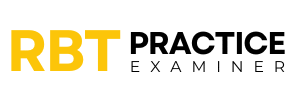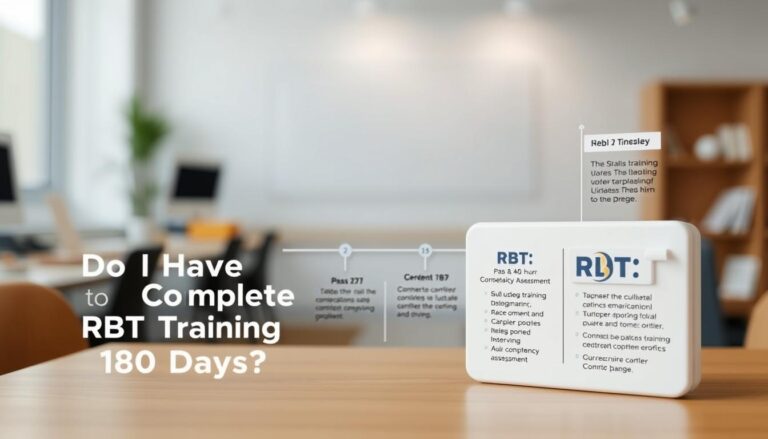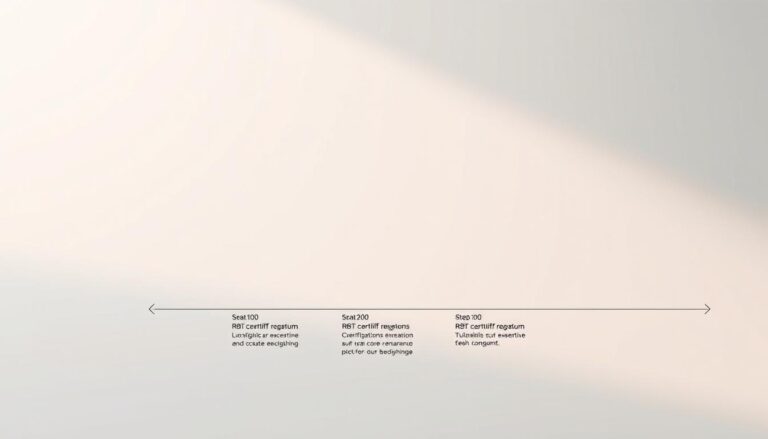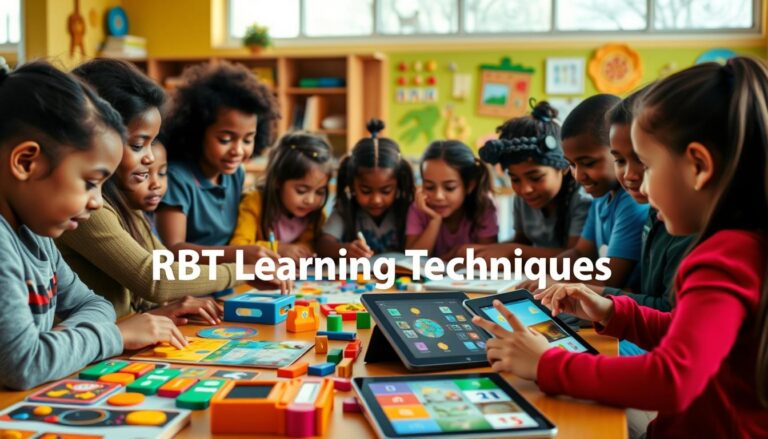Unlock Your Brain Power: Your Roadmap to RBT Certification
Starting your journey to become a Registered Behavior Technician (RBT) needs smart brain training and hard work. This guide will show you how to get certified by giving you key tips. These tips will make learning easier and more reachable.
To get RBT certified, you must do more than just remember facts. You need strategies that boost your brain and make you a pro. Our guide simplifies complex learning into easy steps, making certification possible for you.
If you’re into helping people with autism, this guide has great ways to improve your mind. You’ll learn how to learn better and get the skills for a fulfilling career in healthcare.
In this guide, we’ll share effective methods for the RBT certification process. You’ll learn study tips and ways to improve your brain. This knowledge will make you stand out in this exciting field.
Are you ready to unlock your brain’s power and start your journey to becoming a skilled RBT? Your career transformation begins today.
Understanding the RBT Certification Journey
Starting your journey to become a registered behavior technician needs careful planning and dedication. The RBT certification process is designed for those passionate about helping people with behavioral challenges.
The path to certification involves key steps. These steps will turn your dream of a career in applied behavior analysis into reality.
Core Requirements for RBT Certification
To get certified, you must meet certain standards:
- Be at least 18 years old
- Hold a high school diploma or equivalent
- Pass a background check
- Complete 40 hours of training supervised by a BCBA
- Successfully pass the RBT competency assessment
Timeline and Expected Milestones
Here’s a timeline for RBT exam preparation:
- Initial Training (40 hours): 2-4 weeks
- Competency Assessment: 1-2 weeks
- Examination Registration: 1 week
- RBT Exam: Half-day process
- Certification Approval: 1-2 weeks
Investment and Resources Needed
Here’s what you’ll need to invest in:
- Training Course: $100-$500
- Background Check: $50-$100
- RBT Exam Fee: Approximately $200
- Study Materials: $50-$150
Passing the RBT exam requires commitment, smart studying, and a true passion for helping those with behavioral needs.
The Science Behind Effective Brain Training for Certification
Learning the science behind brain training can change how you study and prepare for certifications. The brain’s ability to change and make new connections is key. This is called neuroplasticity.
Improving cognitive function is backed by science. It’s a proven way to get better at learning. Studies show several ways to boost your mental skills:
- Neural pathway development through targeted mental exercises
- Synaptic plasticity enhancement
- Cognitive flexibility training
The brain works like a complex network. Each time you learn something new, it makes new connections. Deliberate practice and strategic mental engagement can really help. This makes getting your RBT certification easier and faster.
Research shows certain brain training methods can speed up learning. These include:
- Active learning strategies
- Mindful meditation
- Targeted memory consolidation techniques
- Neurological stimulation exercises
By using these science-backed methods, you can change how you study. This will help you use your brain’s full learning power when getting your RBT certification.
Essential Study Techniques for RBT Exam Success
To pass the Registered Behavior Technician (RBT) exam, you need smart study tips and brain training. It’s not just about memorizing. The right methods can make studying easier and improve your test scores.
Top RBT test-takers know studying is more than just reading books. Your brain needs special training to grasp complex behavioral analysis ideas.
Active Recall Methods
Active recall is a top brain training strategy. It makes you recall information from memory. This strengthens your brain’s connections and helps you remember longer.
- Create flashcards with key behavioral analysis terms
- Practice explaining concepts without referencing notes
- Use self-quizzing techniques to challenge your understanding
Spaced Repetition Strategies
Spaced repetition breaks learning into manageable chunks. It prevents mental burnout and boosts retention. This method reviews material at the best times to solidify your grasp.
- Review new material within 24 hours of initial learning
- Revisit concepts after one week
- Conduct thorough reviews every month
Mind Mapping Techniques
Mind mapping is great for visual learners. It helps you see connections between RBT concepts clearly.
- Use color-coded branches for different behavioral analysis categories
- Connect related concepts with clear, logical links
- Draw diagrams that show relationships between ideas
Remember, consistent practice and a structured approach are key to mastering RBT certification study techniques.
Boost Your Brain to Become a Certified RBT

To get ready for RBT certification, you need more than just studying. You must find ways to boost your brain and improve your learning skills. Making your brain work better is essential for passing the tough certification tests.
Brain training for RBT certification includes several important steps:
- Develop a targeted mental fitness routine
- Practice focused concentration techniques
- Implement effective memory enhancement methods
- Create personalized learning strategies
Neuroplasticity is very important in your learning journey. By consistently challenging your brain, you can make new paths for learning. This helps you learn faster and remember more, making you a certified RBT more quickly.
Some key ways to improve your brain include:
- Mental exercise routines
- Mindfulness meditation
- Nutritional brain support
- Quality sleep optimization
Those aiming to be RBTs must see brain training as a whole process. It involves mental exercises, changing your lifestyle, and learning in a smart way. Your effort in improving your brain will greatly help you pass the certification.
Remember, improving your learning skills is not about working harder. It’s about working smarter. By using these smart strategies, you’ll get the mental strength needed to do well in your RBT certification journey.
Maximizing Memory Retention During RBT Training
Getting ready for RBT certification needs smart ways to boost brain power. Learning memory tricks can change how you study. It makes it easier to remember tough behavioral analysis ideas.
Top RBT students know it’s not just about studying. They use special memory tricks to learn better and stay interested.
Mnemonic Devices for Technical Terms
Mnemonic devices are great for remembering hard RBT words. They help you:
- Create funny acronyms for hard terms
- Make up vivid mental pictures
- Turn hard ideas into easy-to-remember images
For example, making weird mental pictures of RBT terms can make learning fun and easy.
Visual Learning Strategies
Visual learners can use cool ways to remember stuff:
- Make colorful mind maps
- Use flowcharts to get the big picture
- Make study guides with pictures
Visual stuff makes hard info easy to remember.
Practice Testing Methods
Practice tests are key to keeping what you learn. Try these tips to remember more:
- Practice like it’s the real test
- Use spaced repetition
- Check how you did after each test
Using these memory tips will help you do great on your RBT test.
Creating an Effective RBT Study Schedule

Creating a good study schedule is key to passing the RBT certification. A well-planned schedule helps you use your study time wisely. It also keeps your life balanced.
When making your RBT study plan, keep these tips in mind:
- Know how much time you have
- Find when you study best
- Set achievable study goals
- Make your study routine flexible
Studying for RBT certification needs a clear plan. Your study schedule should be tailored to you and flexible. Break your study into smaller parts. Focus on steady progress, not cramming.
| Study Time Allocation | Recommended Hours | Focus Area |
|---|---|---|
| Weekday Evenings | 1-2 hours | Core Content Review |
| Weekend Mornings | 3-4 hours | Practice Exams & Deep Learning |
| Short Daily Sessions | 30 minutes | Rapid Knowledge Reinforcement |
Don’t forget to take breaks and check your progress often. This helps you stay on track and keeps you motivated.
Cognitive Enhancement Strategies for Better Learning
Getting ready for RBT certification is more than just studying. Using brain boosting techniques can really help improve your learning skills. Our approach includes many strategies to help your mind stay clear and work at its best.
Good brain performance comes from many factors working together. We’ll look at important strategies to help you reach your mental peak during your certification journey.
Nutrition for Brain Performance
What you eat is key to better learning. Some foods can really help your brain work better and stay healthy:
- Omega-3 rich foods like salmon and walnuts
- Antioxidant-packed berries and dark chocolate
- Green leafy vegetables for mental sharpness
Sleep Optimization Tips
Good sleep is vital for your brain to process information well. Here are some tips:
- Maintain a consistent sleep schedule
- Create a dark, cool sleeping environment
- Avoid electronic devices before bedtime
Stress Management Techniques
Stress can hurt your brain’s performance. Here are some ways to keep your mind sharp:
| Technique | Benefit |
|---|---|
| Meditation | Reduces mental fatigue |
| Deep breathing exercises | Improves focus and concentration |
| Regular physical activity | Enhances overall brain function |
By using these brain-boosting strategies, you’ll be ready to face RBT certification challenges with a sharper mind.
Practical Applications of RBT Concepts
To become a registered behavior technician, you need more than just book smarts. The path to passing the RBT exam involves turning abstract ideas into real actions that help people. This makes a real difference in their lives.
Applying RBT concepts in real life needs a smart plan. You must learn to mix book learning with hands-on practice. This is key for aspiring behavior technicians.
- Observe client interactions with precision
- Document behavioral patterns accurately
- Implement intervention strategies effectively
- Communicate clearly with supervision teams
Top RBT pros know how to apply what they’ve learned. Clinical scenarios are key for turning theory into action.
| Skill Domain | Practical Application | Key Competency |
|---|---|---|
| Behavioral Assessment | Direct observation techniques | Objective data collection |
| Intervention Planning | Customized behavior modification strategies | Individualized approach |
| Data Tracking | Systematic progress monitoring | Quantitative analysis |
Getting ready for the RBT exam is more than just remembering facts. It’s about building a wide range of skills. These skills turn theory into real help. You need both technical skills and the ability to work well with others to do well in this field.
Overcoming Common RBT Certification Challenges
Getting RBT certified can seem tough. Many face mental hurdles that make it hard to keep going. But, with the right brain training, you can overcome these obstacles and reach your goal.
Managing Test Anxiety
Test anxiety can stop even the best-prepared people. Here are some tips to help you stay calm and focused:
- Practice deep breathing before exams
- Have a consistent pre-test routine
- Use positive visualization and mental rehearsal
- Make a study space that lowers stress
Time Management Solutions
It’s hard to balance studying with life. Here are some brain training tips to help:
- Make a detailed study plan
- Break study into smaller parts
- Use apps to track your progress
- Focus on the most important study materials
Complex Concept Mastery
Learning tough RBT concepts needs new ways of learning. Break down hard topics into easy parts. Use pictures, make mind maps, and practice recalling information to get it better.
With these strategies, you’ll grow more confident. You’ll also get the mental strength to pass your RBT certification.
Digital Tools and Resources for RBT Preparation

Getting ready for the RBT exam needs smart digital plans. The right tech can change how you study, making getting certified easier and fun. Today’s digital tools offer new ways to learn and remember things better.
Preparing for the RBT exam is not just about books anymore. Digital tools give you interactive and tailored study experiences. They fit different ways of learning.
- Mobile Learning Apps
- Quizlet for digital flashcards
- Anki for spaced repetition
- StudyBlue for collaborative study materials
- Online Practice Platforms
- Behavior Analyst Certification Board official practice exams
- Pocket Prep RBT mobile application
- Online simulation tests
Joining virtual study groups can really help with RBT certification prep. Sites like Reddit, Facebook groups, and forums for RBTs are great. They let you share knowledge and get support from others.
When picking digital study tools, choose ones that cover all RBT exam topics well. Look for tools with interactive learning modules, ways to track your progress, and detailed reports on how you’re doing.
Pro tip for RBT exam prep: Use a mix of digital tools for a strong study plan. Try video lessons, practice tests, and interactive learning sites. This way, you’ll learn and remember more.
Building Professional Competency Through Practice
To become a registered behavior technician, you need more than just book knowledge. Practical skills are essential for success. You’ll need to practice with real-world training to boost your brain and get certified as an RBT.
Building your skills as a professional takes a smart approach to learning. Here are some techniques to help you get ready for your RBT certification and your future career:
Hands-on Training Exercises
Practical training is key for those aiming to be a registered behavior technician. These exercises help you learn important skills by doing them:
- Observational skill development
- Data collection techniques
- Intervention strategy implementation
- Client interaction simulations
Role-Playing Scenarios
Role-playing is a great way to learn and become a certified RBT. It lets you:
- Practice communication skills
- Develop problem-solving abilities
- Build confidence in tough situations
- Understand complex behavioral interactions
Skill Assessment Techniques
Improving yourself is important for professional growth. Good skill assessment includes:
- Self-reflection on your performance
- Peer feedback analysis
- Tracking your progress
- Finding areas to get better
Using these practical training methods, you can build the confidence and skills needed to succeed. The journey to becoming a registered behavior technician is tough but rewarding.
Maintaining Focus During Long Study Sessions
Getting ready for RBT certification needs a lot of mental focus. Using brain-boosting methods can really help you stay focused for longer. It’s all about knowing how to make your brain work better during study time.
Experts say that keeping your attention for a long time can be learned. Here are some top tips to make your studying more effective:
- Try the Pomodoro Technique – Break your study into 25-minute focused blocks
- Make a study area free from distractions
- Do some mindfulness meditation before you start studying
- Use active learning to keep your brain active
Improving brain function is more than just sitting and reading. Taking short breaks is key to keeping your brain sharp. Take 5-10 minute breaks to recharge. Use these moments for light exercise or deep breathing to get your focus back.
What you eat and drink also affects your brain. Drink plenty of water, eat foods that are good for your brain, and get enough sleep. These tips will help you stay sharp during tough study times.
- Drink water often
- Eat snacks that are good for your brain
- Keep a regular sleep schedule
Success in studying depends on knowing how you focus best. Try different methods to find what works for you. Remember, the more you practice, the easier it gets.
Final Exam Preparation Strategies
Getting ready for the RBT certification exam needs a smart plan. Your last weeks of study should be all about a deep review and focused practice. This will help you do your best.
Good RBT exam prep includes several important steps:
- Make a detailed study plan that covers all key RBT topics
- Practice with multiple-choice questions that are like the real exam
- Go over task lists and specific behavior intervention methods
- Work on managing your time for the test day
Study tips for RBT certification stress the value of practice testing. Take timed practice tests to feel more confident and spot areas to improve.
Important prep methods are:
- Do a deep dive into the content
- Use flashcards for important terms
- Join study groups or online forums
- Get advice from certified RBT experts
Your final prep should also tackle stress and anxiety. Try relaxation methods like deep breathing and positive thinking to stay calm during the test.
Remember, good prep is more than just memorizing. Knowing the basics of applied behavior analysis will help you answer tough questions better in your RBT certification exam.
Conclusion
Starting your journey to become a Registered Behavior Technician (RBT) takes hard work, smart learning, and a desire to grow. This guide has shown you how to boost your brain and become certified. You’ve learned key skills for this fulfilling career.
Getting ready for the RBT exam is just the start. You’re also building skills that will help people with behavioral challenges. The brain-boosting tips you’ve picked up will help you in your career, not just during the exam.
Success in getting your RBT certification is not just about knowing stuff. It’s about showing you’re dedicated to being great at your job. The tools and methods you’ve learned will help you in your future career. Keep focused, keep learning, and trust in your preparation. Your hard work will turn your dreams into a real career helping others.
But your journey doesn’t stop after you get certified. The skills you’ve gained are just the start of your lifelong commitment to grow and help others. Keep up the challenge, stay motivated, and believe in your success as a Registered Behavior Technician.







